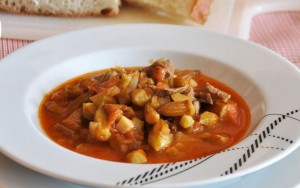Viva la ‘Bamyah Geragour’

I seldom dream so it couldn’t have been the remnant of an early morning nocturnal manifestation. But it was real enough that in my semi-zombie state I wrinkled my sensitive nose to a wonderful familiar aroma that filled the air surrounding me. It brought me to my senses.
What tickled my nostrils was the unmistakable fragrance of bamyah geragour being cooked. Armenian okra stew. It was the haunting mélange of lamb cubes, onions, okra, and tomato sauce. Haunting because my mother, whose bamyah stew was highly rated, passed away in 1989 at age 84. She used to serve bamyah stew with buttery rice pilaf to accompany the main meat course on special occasions when the Apigian household would host special family or friends for dinner.
I had not cooked anything to emit such an aromatic trait to my Armenian-trained foody nose. It must have been my mother sending me a message—and what a way to grab my attention. (As a matter of fact, I find the lingering after-smell of cooked food to be offensive. That was not at all what I was experiencing in my semi-conscious state.
I was in bamyah heaven. It was as though Mom was still alive and getting an early morning head start on tonight’s family dinner.)
Was mom expecting company or had my father, the food shopper in the family, been to Detroit’s Eastern Market and happened upon okra good enough to catch his eye and purchase?
I finally awoke enough to say out loud, “Mom is that you? Are you here visiting me? Trying to soothe my loneliness in your own special way?”
Her “visit” reminded me of the time, many years after her death, when I found a package of her unopened Salem cigarettes hidden in a dark corner of the linen closet. I held the pack sweetly in my hand knowing full well she had tucked the cigarettes away. The find was a tender reminder of mom, usually dressed very casually in slacks and a printed shirt to perform her daily household chores, looking like a babe when the occasion called for dress-up time in a lovely dress or pantsuit and freshly permed hair.
She dictated her recipes to me for future reference. She could remember ingredients without referring to notes, while I on the other hand needed to read the recipe repeatedly before I could commit it to memory.
She always warned me to be careful and to not overcook the okra, which was a temperamental vegetable because it would get slimy. That sounded so unattractive that, although I love okra stew with or without the inclusion of lamb meat, in my eager endeavor to master Armenian cuisine like my mother, I did not attempt okra stew until only a few years ago.
A friend assured me that frozen baby okra instead of fresh worked just as well, and having it in the freezer would make it readily available for when I worked up the nerve to make the stew.
My husband assured me that he did not like okra and would under no circumstance eat it. It was the only food item of his beloved mother-in-law’s kitchen creation that the unfussy eater did not happily consume.
Living dangerously, I eyed the frozen baby okra in the supermarket freezer. I pondered the idea of putting a bag of it in my cart with trepidation. It was the slimy part that put the fear of God in me. I didn’t want to fail. Could I put my mother’s recipe instructions to work with my memory skills?
I purchased a bag of okra and moved bravely forward, brazing the lamb cubes with onions until tender, then adding the okra, water, salt, pepper, tomato paste, and just a few hot pepper flakes. I gave it a stir, put the lid on, turned the burner to medium-low, and made the sign of a cross on the pan as I frequently do.
The room soon had the amazing fragrance of okra stew wafting through the kitchen. How wonderful. The see-through lid offered the opportunity to view the bubbling process with my fingers crossed.
Ahh! My mother’s magical kitchen creation had come to surround me in old country revelry with that fantastic aroma.
My husband had the annoying habit of lifting pot lids and sneaking a taste of whatever I was preparing. This time, he sneered, saying, “That looks like okra you’re cooking. You know I’ll not eat that stuff, but it does smell good. Maybe I’ll just taste a little bit.” He dipped a spoon into the pot removing one okra and some liquid, then dipped back into the pot removing a piece of lamb. He smiled and surprisingly voiced approval. He liked the bamyah stew after all! All these years I had hesitated to make the stew, only to discover that I could master the okra dish and the husband loved it!
“Try it, Mikey, you’ll like it” I teased him.
Was this early morning “visit” from my mother her way of saying to me, “Serpouhie I am well and I will always be with you. The smell of the bamyah awakening you this morning alerts you to my eternal presence in your life in my own way. You are my youngest and very caring daughter of your father and me. I know how frightened you would become when I had a spell of not feeling well. Now it is your time. Your father and I are fine up here together. Bob has joined us too. We are with your brother Apraham. All those years he was a young army solider during World War II took a toll on us, but God brought him safely home to his family again.”
Love and the absence of parents can be a hardship and we must deal with realistically, but how delightful it is when we receive signs to let us know they are still with us in surprising ways that are reminiscent of a happy past.
I try to convince myself I am not afraid. To quote Irish writer John Cassidy, “Writing is love,” and so my mission is to write.
As Armenians we grew up in a culture of certain values and expectations, which perhaps were even more strongly enforced because of the cruelty forced upon us by the Ottoman Turks. We always had a hard work ethic on our side. It made us successful in Turkey and America even though our immigrant-generation ancestors often could only find employment in tough demanding factory and foundry jobs. They slugged it out day by day, putting in the long hard hours necessary to marry, have children, feed the family, buy a house, and build community centers and churches. How did they do it? With fortitude and determination to rebuild what the Turks had tried to destroy; they failed miserably and they know it, although they don’t acknowledge it.
What does that have to do with okra stew? When you put quality ingredients into a cooking utensil or in life, the end result will be something delicious, fragrant, and pleasing to the palate—like mom’s okra stew.
Source: Armenian Weekly Mid-West

